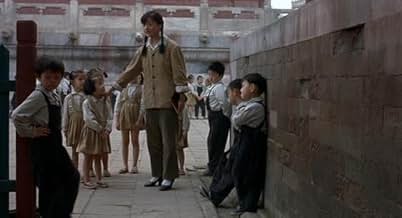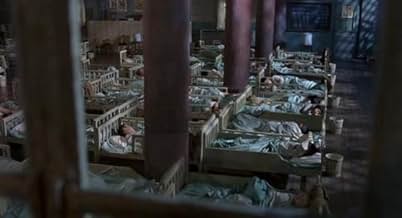AVALIAÇÃO DA IMDb
6,7/10
1,6 mil
SUA AVALIAÇÃO
Adicionar um enredo no seu idiomaA young boy starting school for the first time struggles to fit in to a strictly regimented society in in post-revolutionary China.A young boy starting school for the first time struggles to fit in to a strictly regimented society in in post-revolutionary China.A young boy starting school for the first time struggles to fit in to a strictly regimented society in in post-revolutionary China.
- Prêmios
- 8 vitórias e 3 indicações no total
- Direção
- Roteiristas
- Elenco e equipe completos
- Produção, bilheteria e muito mais no IMDbPro
Avaliações em destaque
I'm disappointed by all of the previous comments on this film. This film seemed to me to be far more deeply layered and textured than previous writers have given it credit for.
Having studied Chinese film (particulary the work of the 5th generation, which this film isn't part of), it's my understanding that Chinese films can't be 'read' in the same way as Western films. Due to censorship in China Chinese directors find different ways of telling stories, more often than not by dressing them up as something else. Therefore I don't believe that this film can be taken at face value. I don't believe this is a film about a small boy being sent to a kindergarten by his father and trying to earn Little Red Flowers. I think an important thing to notice is the way the boy changes. He starts off hating the regime of the school but wanting to fit in, wanting to earn a red flower, but he never does, so he deliberately alienates himself. There are many scenes where he sets himself apart from the group, and he becomes a rebel - he stirs up unrest amongst the other children. He challenges the authority. This seems to me to be deeply allegorical.
I was hoping to read some comments here that would help me understand this film, because I'm finding it puzzling. I found it a very hard film to watch, and I can't say I really enjoyed it. I found it slow and repetitive with far too much emphasis on 'peeing and pooping'. However, I'm finding it a very interesting film to think about and try to decipher. I would very much like to read other readers comments on this. What, for example, is the significance of the hospital? And the children's names? There are many many questions to be answered, and many more to be asked. By my own admission I'm not very good at reading films, but I am aware of what needs to be read!
Having studied Chinese film (particulary the work of the 5th generation, which this film isn't part of), it's my understanding that Chinese films can't be 'read' in the same way as Western films. Due to censorship in China Chinese directors find different ways of telling stories, more often than not by dressing them up as something else. Therefore I don't believe that this film can be taken at face value. I don't believe this is a film about a small boy being sent to a kindergarten by his father and trying to earn Little Red Flowers. I think an important thing to notice is the way the boy changes. He starts off hating the regime of the school but wanting to fit in, wanting to earn a red flower, but he never does, so he deliberately alienates himself. There are many scenes where he sets himself apart from the group, and he becomes a rebel - he stirs up unrest amongst the other children. He challenges the authority. This seems to me to be deeply allegorical.
I was hoping to read some comments here that would help me understand this film, because I'm finding it puzzling. I found it a very hard film to watch, and I can't say I really enjoyed it. I found it slow and repetitive with far too much emphasis on 'peeing and pooping'. However, I'm finding it a very interesting film to think about and try to decipher. I would very much like to read other readers comments on this. What, for example, is the significance of the hospital? And the children's names? There are many many questions to be answered, and many more to be asked. By my own admission I'm not very good at reading films, but I am aware of what needs to be read!
If Yuan Zhang's "Little Red Flowers" isn't quite in the same class as Nicolas Philibert's masterpiece "Etre et avoir" it is still one of the best films ever made about small children in a school environment but whereas the Philibert film was a documentary this is fiction and at times the performances or 'non-performances' Zhang draws from the children are nothing short of miraculous. The setting is a boarding kindergarten in post-Revolutionary China and the central character is Fang Qiangqiang, a disruptive four year old desperate to fit in.
There's no real plot to speak of and Zhang films it as if it were a documentary with perhaps more of an emphasis on the children's toiletry habits than some people might like. Although the film is perfectly innocent and full of charm, repetitive shots of our little hero and his friends in the altogether could prove problematic to Western audiences. (The Chinese, or is it just Zhang, seem obsessed with peeing, pooping and farting). Look beyond that, however, and this is a lovely account of one little boy's need for acceptance. The title refers to the little red flowers the children are rewarded for good behavior.
There's no real plot to speak of and Zhang films it as if it were a documentary with perhaps more of an emphasis on the children's toiletry habits than some people might like. Although the film is perfectly innocent and full of charm, repetitive shots of our little hero and his friends in the altogether could prove problematic to Western audiences. (The Chinese, or is it just Zhang, seem obsessed with peeing, pooping and farting). Look beyond that, however, and this is a lovely account of one little boy's need for acceptance. The title refers to the little red flowers the children are rewarded for good behavior.
Little Red Flowers is rather-a bright and breezy film on the surface, a film coated with a light and somewhat fluffy exterior about a young boy's mishaps at school and rather quaint friendship he strikes up with another girl that overall masks what rather disturbing substance lies beneath; a film featuring young children looking cute and doing all manner of rather childish things which we may find quite sweet but much more importantly exploring ideas of power, control and the reactions those go through when exposed to these items. Chinese director Yuan Zhang distills, through very young children occupying a live-in nursery, a human-being's reaction to imperialistic and strict attitudes towards life and functioning which lead's to many seemingly happily abiding but one overtly reacting to the taking away of their freedom and their choice as to whether or not to live under the inferred state's imposed sanctions. The film is on one level a whimsical enough comedy about a child fumbling and bumbling their way through a locale with others his age whom get in on the act far quicker than he does, deeper still it is a quite frightening plight of one person's struggle against overwhelming odds which will eventually lead to attempted revolution and proposed violence when the way of living isn't inclined enough towards one's own choice.
The film begins with the lead, a four year old Fang Qiangqiang played by child actor Bowen Dong, in the process of being delivered to a boarding nursery school for both genders by his father in late-1940's China. The father is kept anonymous, cut off from around the knees upwards leaving the audience solely to be able to focus on that of both the disillusioned Fang and the headteacher Miss Li (Rui). Fang is very much an outcast to this play school nursery zone, the other children have already long since been moulded into a unit of kids whom go along with the teachers' wishes and do what they're told. The film enjoys its mise-en-scene of a somewhat militarian nature at the school, the trooping around of the playground by the teachers echoing the activity to that of guards at a kind of establishment as well as the sleeping quarters of the children shrouded together as if in an army barracks, It is a place Fang is delivered to in the middle of winter, the climbing-frames and roundabouts lying dormant and forlorn outside as they sit there drenched in heavy snow. Inside, regimental set ups dominate the way of operation with rewards distributed by the establishment in the form of the titular little red flowers as children go through with the basic life-skills more inclined towards the hygiene required in life.
Fang is initially unable to compete; he's left there to cry an awful lot, appears in different clothing to that of the others and dislikes both the regime and system. At first it's inclined it may be down to home-sickness, but as things transpire the consequent reactions to the school's set up infer that it is fear and sadness born out of how things are run. There is a wide shot during his tenure as the cygnet amidst the swans which encompasses the sheer menagerie of other youngsters within the locale encapsulating his alienation, as he is greeted into the imminent scenario by a sternly face teacher and then forced into changing into his day clothes, despite knowledge all round that he is unable to do so, in front of everybody. There is a temptation to read Little Red Flowers on an initial level linked more broadly to that of it being a straight forward depiction of a school for children doing what they're told since, how else are they supposed to live? On another level, the film's clear distinction between ruler and ruled twinned with the fact it has been produced by a nation no-less than China along with the fact director Zhang strikes me, from reading of his past-work, to be a too accomplished-a filmmaker to produce a straight up film depicting such a scenario without allegory.
One of the starker moments in his film actually occurs outside of the boarding kindergarten, a short walk around local sites or what-not resulting in the children venturing past a small squad of Chinese soldiers out and about going through drills for whatever purpose; the placing of them in the background as our children occupy the foreground effectively competing in the same action foreshadowing generational jumps from regimental circumstances unto further ways of living of similar distinction. While there is nothing particularly sordid or necessarily evil about the school, exemplified in a song it has everybody sing about the sharing of an apple and upholding positive characteristics, it is a rather engaging look into how a working system of such an assimilated nature can affect those of which are processed through it; more broadly, how imagery and particular methods in bringing somebody up or bringing somebody around to be of a particular 'type' can have ill affects on those undergoing said process, the majority of it culminating in a really smartly played drama tackling some interesting themes.
The film begins with the lead, a four year old Fang Qiangqiang played by child actor Bowen Dong, in the process of being delivered to a boarding nursery school for both genders by his father in late-1940's China. The father is kept anonymous, cut off from around the knees upwards leaving the audience solely to be able to focus on that of both the disillusioned Fang and the headteacher Miss Li (Rui). Fang is very much an outcast to this play school nursery zone, the other children have already long since been moulded into a unit of kids whom go along with the teachers' wishes and do what they're told. The film enjoys its mise-en-scene of a somewhat militarian nature at the school, the trooping around of the playground by the teachers echoing the activity to that of guards at a kind of establishment as well as the sleeping quarters of the children shrouded together as if in an army barracks, It is a place Fang is delivered to in the middle of winter, the climbing-frames and roundabouts lying dormant and forlorn outside as they sit there drenched in heavy snow. Inside, regimental set ups dominate the way of operation with rewards distributed by the establishment in the form of the titular little red flowers as children go through with the basic life-skills more inclined towards the hygiene required in life.
Fang is initially unable to compete; he's left there to cry an awful lot, appears in different clothing to that of the others and dislikes both the regime and system. At first it's inclined it may be down to home-sickness, but as things transpire the consequent reactions to the school's set up infer that it is fear and sadness born out of how things are run. There is a wide shot during his tenure as the cygnet amidst the swans which encompasses the sheer menagerie of other youngsters within the locale encapsulating his alienation, as he is greeted into the imminent scenario by a sternly face teacher and then forced into changing into his day clothes, despite knowledge all round that he is unable to do so, in front of everybody. There is a temptation to read Little Red Flowers on an initial level linked more broadly to that of it being a straight forward depiction of a school for children doing what they're told since, how else are they supposed to live? On another level, the film's clear distinction between ruler and ruled twinned with the fact it has been produced by a nation no-less than China along with the fact director Zhang strikes me, from reading of his past-work, to be a too accomplished-a filmmaker to produce a straight up film depicting such a scenario without allegory.
One of the starker moments in his film actually occurs outside of the boarding kindergarten, a short walk around local sites or what-not resulting in the children venturing past a small squad of Chinese soldiers out and about going through drills for whatever purpose; the placing of them in the background as our children occupy the foreground effectively competing in the same action foreshadowing generational jumps from regimental circumstances unto further ways of living of similar distinction. While there is nothing particularly sordid or necessarily evil about the school, exemplified in a song it has everybody sing about the sharing of an apple and upholding positive characteristics, it is a rather engaging look into how a working system of such an assimilated nature can affect those of which are processed through it; more broadly, how imagery and particular methods in bringing somebody up or bringing somebody around to be of a particular 'type' can have ill affects on those undergoing said process, the majority of it culminating in a really smartly played drama tackling some interesting themes.
I've watched this film a couple of times and when you think about it, it would be very hard to make such a film and I congratulate the film makers for this effort. But to give it 1 star because it contains "gratuitous child nudity"? is sick. I am referring to a review further up here who talks about child nudity and sick people who "enjoy" that sort of thing.. You know, since you're pointing all these things out maybe you are one of those people, in denial.. One of those that also have issues with women breast-feeding in public.. I didn't even notice "child nudity".. What i saw is a film about little human beings in a boarding school. It was filmed through the eyes of a little child where everything is natural, including nakedness and bodily functions. I was like that back in Eastern Europe, slightly older, but in a similar situation and it kind of brings back some funny memories. It is this kind of righteous moralistic polemic that stirs me right up.. It is you who is troubled by this "child nudity" so stop projecting your perversity on others PLEASE! This is a great 'little' film.
The movie begins with a cute four year old boy - Fan Qiang Qiang - being admitted by his father in a boarding kindergarten since both the parents are working at different places and are not in a position to care for him.
The kindergaten is strict in enforcing discipline and expects all students to comply with a set of regulations which extend to an extensive gamut of activities from dressing/undressing by oneself, cleanliness, cordial communciaton to others, respect to elders, maintaining order and even to timely pooping (not to forget the washing of hands thereafter). Every successful compliance by the students is rewarded with the titular little red flower which are diplayed on a scoreboard against their names and any subversion results in forfeit of a flower earned earlier.
Qiang is a free spirit by nature and finds it difficult to comply with the strict routines of the school. He is unable to dress/undress himself and does not play with other children. He is also unable to get over the habit of wetting his bed which results in him being ridiculed as "the king of bedwetting" by other students. Consequently, he is unable to earn any little red flower which is so coveted. When his repeated attempts to conform and fit into his desginated role & behaviour fail, Qiang feels enormous frustration which pushes him down the road of being an aggressive rebel. The rest of the movie narrates how this conflict between a rebellious Qiang and the disciplinarian kindergarten unfolds.
This is a simple movie which, on the face of it, successfully captures the lives of the tiny tots in a rich canvas sparkling with laughter, fun, frolic, tensions, frustrations, helplesness, sadness as experienced by these cute little toddlers. At a deeper and not-so-subtle level, this movie represents a metaphor for the state of Chinese society under the Communist regime. It portrays the simmering conflict in the society between the innate tendency of every citizen to seek to establish their individuality and the efforts of a seemingly kind, yet oppressive state, which tries to micro-monitor as well as manage the affairs of individuals, through a defined regimen, for what it feels is for a loftier goal of collective order and resultant peace. In the process, any expressions of individuality are construed as a subversion of the carefully engineered public order and is brutally subjugated & crushed.
Through the struggles of his charming little protaganist, Qiang, the director, Zhang Yuan, has successfully captured this continuing conflict between conformity and individuality which permeats the Chinese society. He must also be commended for eliciting such authentic and believable performances (if one can call them so, for they appear so natural) from his cute little cast, especially the adorable and expressive Dong Bowen who plays the young Qiang.
The open-ended finale of the movie is apt for it throws several unanswered questions at the protaganist as well as the viewer and initaites a train of thought on the central conflict portrayed in the movie.
Clocking just about ninety minutes, this movie is short, subtle, highly engaging and raises several questions for the viewer on the merits of conformity, group mentality, need for individuality, the conflict between a society steeped on confirmity & group mentality when faced with expressions of individual freedom as well as the effects of such conflicts on individual members of such society.
The kindergaten is strict in enforcing discipline and expects all students to comply with a set of regulations which extend to an extensive gamut of activities from dressing/undressing by oneself, cleanliness, cordial communciaton to others, respect to elders, maintaining order and even to timely pooping (not to forget the washing of hands thereafter). Every successful compliance by the students is rewarded with the titular little red flower which are diplayed on a scoreboard against their names and any subversion results in forfeit of a flower earned earlier.
Qiang is a free spirit by nature and finds it difficult to comply with the strict routines of the school. He is unable to dress/undress himself and does not play with other children. He is also unable to get over the habit of wetting his bed which results in him being ridiculed as "the king of bedwetting" by other students. Consequently, he is unable to earn any little red flower which is so coveted. When his repeated attempts to conform and fit into his desginated role & behaviour fail, Qiang feels enormous frustration which pushes him down the road of being an aggressive rebel. The rest of the movie narrates how this conflict between a rebellious Qiang and the disciplinarian kindergarten unfolds.
This is a simple movie which, on the face of it, successfully captures the lives of the tiny tots in a rich canvas sparkling with laughter, fun, frolic, tensions, frustrations, helplesness, sadness as experienced by these cute little toddlers. At a deeper and not-so-subtle level, this movie represents a metaphor for the state of Chinese society under the Communist regime. It portrays the simmering conflict in the society between the innate tendency of every citizen to seek to establish their individuality and the efforts of a seemingly kind, yet oppressive state, which tries to micro-monitor as well as manage the affairs of individuals, through a defined regimen, for what it feels is for a loftier goal of collective order and resultant peace. In the process, any expressions of individuality are construed as a subversion of the carefully engineered public order and is brutally subjugated & crushed.
Through the struggles of his charming little protaganist, Qiang, the director, Zhang Yuan, has successfully captured this continuing conflict between conformity and individuality which permeats the Chinese society. He must also be commended for eliciting such authentic and believable performances (if one can call them so, for they appear so natural) from his cute little cast, especially the adorable and expressive Dong Bowen who plays the young Qiang.
The open-ended finale of the movie is apt for it throws several unanswered questions at the protaganist as well as the viewer and initaites a train of thought on the central conflict portrayed in the movie.
Clocking just about ninety minutes, this movie is short, subtle, highly engaging and raises several questions for the viewer on the merits of conformity, group mentality, need for individuality, the conflict between a society steeped on confirmity & group mentality when faced with expressions of individual freedom as well as the effects of such conflicts on individual members of such society.
Principais escolhas
Faça login para avaliar e ver a lista de recomendações personalizadas
- How long is Little Red Flowers?Fornecido pela Alexa
Detalhes
Bilheteria
- Faturamento bruto mundial
- US$ 303.898
- Tempo de duração
- 1 h 32 min(92 min)
- Cor
- Mixagem de som
Contribua para esta página
Sugerir uma alteração ou adicionar conteúdo ausente





















